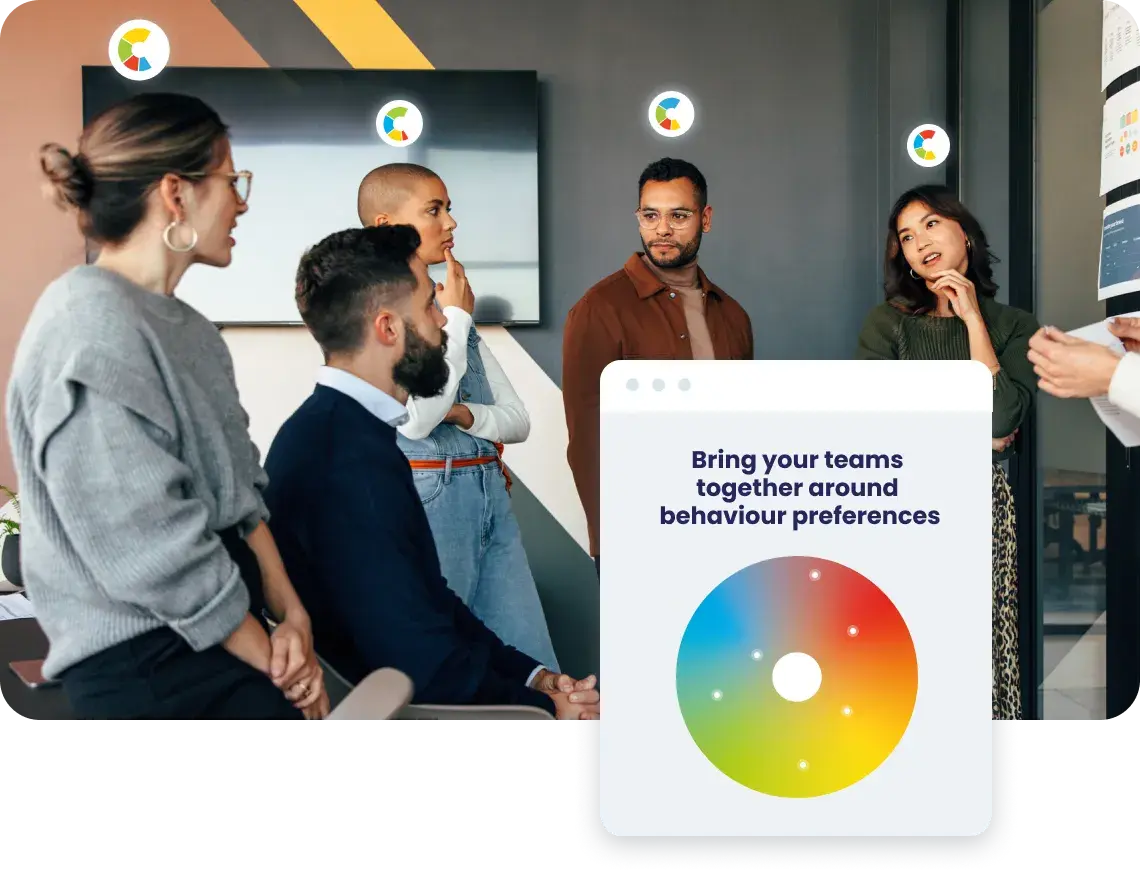
Why behavioural assessments are more effective in business than personality tests
In this article, we list why C-me focuses on behaviour preferences over personality profiling and the benefits it can offer to your organisation.
Personality assessments and personality tests are one of the most commonly used psychometric testing tools for many HR professionals. However, behavioural assessments are a more useful and applicable tool for organisations looking to train and develop managers and leaders, build high performing teams, better engage their employees, improve communication and team dynamics, recruit and onboard new employees, and gain better insight into their organisation as a whole…and that is just the start!
What do we mean by personality?
The American Psychological Association has a very good simple definition to what is a complex subject:
Personality encompasses the characteristic patterns of thinking, feeling, and behaving in individuals. These differences can be attributed to a combination of genetic and environmental factors, including upbringing, life experiences, and socialisation.
Fundamentally, personality is relatively stable over our lifetime. There are exceptions but for most of the population, a person’s personality does not change a lot across their lifetime. Many years of psychological research have been invested to understand what personality is and how to measure it.
Perhaps one of the most significant figures in the history of psychology is Carl Jung a Swiss Psychologist and Psychoanalyst working in the early part of the 20th Century. Jung is famous for developing a theory of personality involving axes between:
- Thinking and Feeling (so called, “rational functions”)
- Introversion and Extroversion (“attitudes”)
- Sensation and Intuition (“irrational functions)
Everyone is plotted somewhere on these axes, essentially explaining that we respond to the world around us as a moving scale rather than in oversimplified binary categories. Still today these axes, along with other notable findings in his work, form the foundations of many commonly used psychometric profiling tools on the market now.
Various psychometric tests exist today for a plethora of purposes and personality profiling is one of the most commonly known. The Myers-Briggs Type Indicator (MBTI) is one of the most researched and used in the world. The test categorises individuals into one of sixteen personality types based on their responses to a series of questions.

Understanding ourselves through personality profiling tools can be an important component of personal growth. These tools allow us to gain insights into our personality traits - our innate tendencies and how we experience the world around us, especially at work. There are significant limitations for their application though, which we will address in a moment. First, let’s define ‘behaviour’.
To read more about the history of psychometric testing and its modern development read our short blog "What you didn't know about the history of psychometric testing". Or for a more detailed history and a discussion about the pros and cons of psychometric testing see our comprehensive blog "Accurate personality assessments: discover yourself".
What do we mean by behaviour?
“An action, activity, or process which can be observed and measured. Often, these actions, activities, and processes are initiated in response to stimuli which are either internal or external.”
Psychology Dictionary
Behaviour can be simply understood as how we express our personality – our actions, conduct, or mannerisms. We observe a person’s behaviour, for example, in the way they respond to various situations, challenges, and tasks they are presented with in their personal and professional lives. We are essentially ‘behaving’ all the time, reacting to every situation, adapting how we want to respond.
Crucially, behaviour can be observed and therefore measured and coached to achieve specific goals or objectives. Behavioural tendencies can be developed over time. Most of us who have been working for some time can obverse in ourselves how our behaviours have adapted to achieve success in the roles that we now have, compared to when we started our working life.
This simple diagram explains where behaviour sits, as the secondary ring to ‘personality’. Our behaviours are what impact everyone else. They emerge from our personality - both in our conscious and unconscious behaviour. Addressing a person's behaviour is less personal and a much more appropriate subject to address in the workplace, than calling in to question someone's personality, which is so much harder to change.

The problem with personality tests
While personality profiling has been used for decades to help individuals understand their tendencies and preferences, as well as for companies to better understand their employees, it has some significant limitations for application:
- One of the primary issues is that personality tests can ‘box’ users into one personality type, which users can feel does not accurately reflect how they can flex and adapt to the need of the moment.
- Moreover, personality tests may not reflect how individuals have developed over time and how they have adapted to become successful in their jobs, therefore they are a poor predictor of job performance. As we have already mentioned, personality is relatively fixed through our lifetime, however, our behaviour can change and develop with self-awareness and developing an appreciation for others who may be wildly different from ourselves.
- 16 categories or more can be overly complicated to remember in every day working life and hinder the application of learnings into job performance. Although we can learn a lot about ourselves through personality tests, trying to remember everyone else's type - in letters or numbers - can be overwhelming and useless when applied to the demands of working life.
So why focus on behavioural assessment not personality?
Below are three observations about the importance of behaviours and why you should be prioritising behaviour over personality.
- BEHAVIOURS CHANGE: self-reflection and feedback on our behaviours - how we are impacting others - can provide valuable insight for self-awareness and personal development. Personality is much more fixed and not something we can do a lot about. It is more effective to focus on what we can change instead of what we cannot.
- BEHAVIOURS ARE OBSERVABLE: it is the visibility of our behaviours that, when adapted, has the power to create the most dramatic change in employee communication, conflict resolution, and team cohesion. Behaviour is much more visible that personality.
- BEHAVIOURS ARE CONTEXTUAL: personality is unlikely to change in two different meetings, but behaviours can and probably should change, depending on the aims of the meeting and the people present. It is appropriate and much more effective to discuss a person's behaviour as part of their personal development in different contexts, than their personality.
Ultimately, it is the way people behave in response to their colleagues and team members, and to challenges that their organisations throws at them, that really affects how well both they and the organisation develop and perform.

Benefits for the individual
Individuals find it easier to relate to the idea of altering their behaviour rather than their personality because behaviours can be modified and to greater affect.
Behavioural preference profiling offers a more actionable approach to development and training for the individual because behaviours are something that a person can choose to change, unlike their personality, which leads to more significant improvements in performance.
Benefits for teams
It is a simple but profound process to help an individual understand their psychological preferences and how these preferences drive aspects of their behaviour; then how to use this knowledge to recognise these same elements in others, and from that enable them to adapt their behaviour to improve their relationships.
The big idea is that behavioural profiling shows teams how behaviours impact their team dynamics, providing a greater understanding of how to appreciate and celebrate their differences, resolve conflicts faster and collaborate better to achieve their goals.
Benefits for the organisation
Behavioural preference profiling is not limited to categorising individuals into a particular personality type. Instead, it focuses on identifying specific behaviours that are necessary for success in a particular role or team, creating a fairer route into a position by allowing room for growth for anyone with any preference combination.
Profiling the behavioural preferences of all members of an organisation provides a unique perspective on collective operating strengths and areas of risk, which are all opportunities for growth.
What are the applications of behavioural preference profiling?
There are many applications within an organisation. Here are just a few examples:
- Building high-performing teams: Identifying the strengths and weaknesses of team members, allowing leaders to build teams that work cohesively, with complementary work styles to reach shared goals.
- Improving recruitment and onboarding success: Supporting employers to select candidates whose behavioural preferences align with the requirements of the role and the culture of the organisation, and then helping to personalise onboarding plans to best suit the new employee's behavioural preferences. For more on the role of behavioural assessments in recruitment see our blog "The missing piece in recruitment".
- Increasing employee engagement: Providing insights in to what motivates employees and how they prefer to work. Enabling employers to create better working environments that fosters engagement and productivity by taking in to account employee preferences.
- Providing insights for leadership and management development: Equipping leaders and managers with vital insights in to the motivations and behaviours of others, especially when individuals they lead are wholly different to themselves; enabling leaders and managers to address conflict constructively, with greater insights as to the 'why' behind conflicts that occur, and also providing a road map out of conflict and back to effective working relationships; providing language for leaders to communicate vision in a way that acknowledges the working preferences of everyone in the team or organisation; providing a better understanding of how to generate buy-in by speaking to individual motivations and working preferences. For a discussion on leadership personality types see our blog "What's the best personality to have as a leader".
- Bolster team communication and dynamics: Teach individuals and teams how to tailor their communication style to suit the preferences of each team member, leading to more effective communication, fewer misunderstandings and ultimately, better team dynamics and performance
- Gather unique organisational insights: Provide macro data on behavioural preferences across the organisation and how this is affecting organisational culture and operations.
What we offer at C-me: One platform with multiple applications

We use tried and tested Jungian psychological foundations, but we apply them to better affect by assessing behaviour preferences rather than personality.
If you would like to talk more about how C-me could use help you and your organisation or clients book a demo with one of our team:




